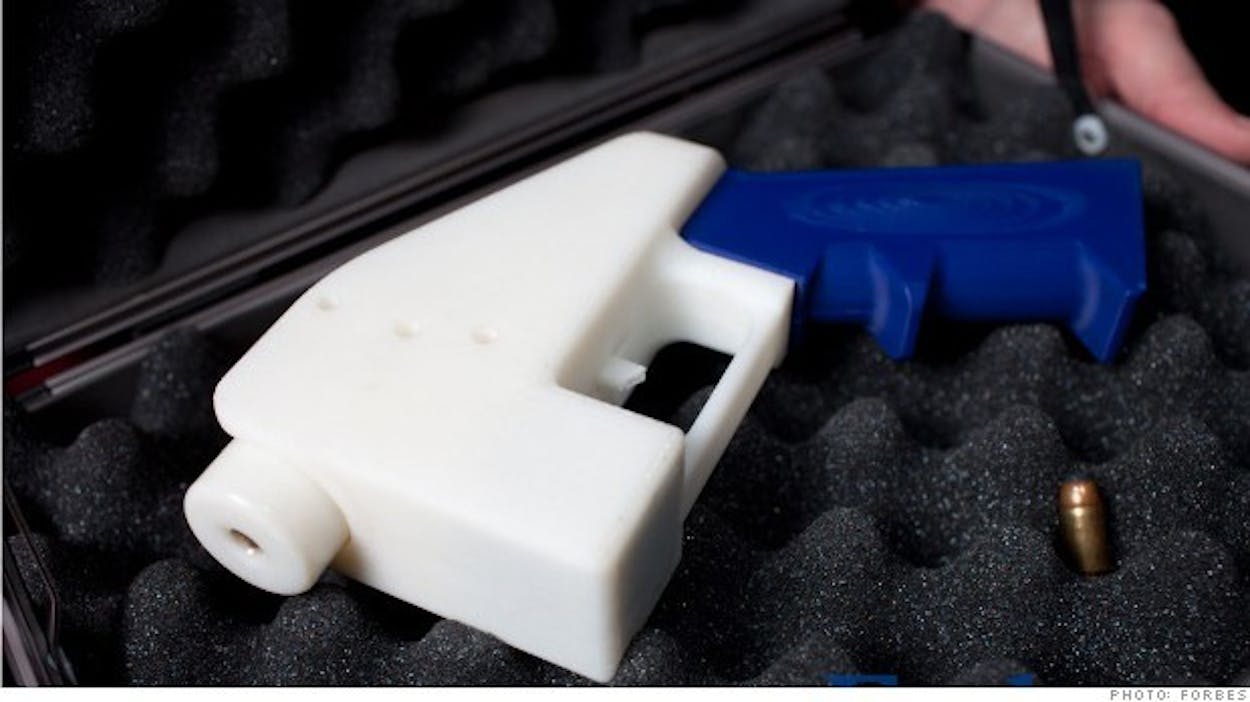The gun control debate may soon involve discussion of plastic printers. On Sunday, a Texas company released a video of its founder firing “the Liberator,” a handgun made entirely from plastic parts that they printed themselves.
Defense Distributed was established in Austin in March of 2012 with the goal of bringing 3-D printable guns to the world. They had previously succeeded in creating usable, printed plastic parts, such as a lower receiver mechanism and a high-capacity ammunition magazine, for weapons like the AR-15 and AK-47.
Defense Distributed co-founder and mouthpiece Cody Wilson said the company will make good on its founding principles by posting the schematics for the gun online within the week, wrote the Daily Mail. That means anyone with a 3-D printer can squeeze off a plastic gun of his or her own.
The weapon—the first of its kind—is composed of sixteen plastic pieces, which snap together; the only non-printed component called for is a simple nail, which is used as a firing pin, according to Engineering.com. Wilson’s company also inserted a six-ounce metal piece into the weapon’s handle so that it will comply with the U.S. Undetectable Firearms Act (1988), which makes it illegal to make or possess any weapon that can’t be seen by metal detectors.
In March, Defense Distributed was granted a Type 7 Federal Firearms License (FFL) by the Bureau of Alcohol, Tobacco, Firearms, and Explosives, which awards the company the right to legally manufacture and sell firearms. Wilson gleefully posted a picture of the permit on the company’s website. DD’s Facebook page states that the entity is not a weapons manufacturer, but a non-profit publisher of intellectual property and information (although some sources are skeptical that Wilson, who has been described as a “free market anarchist,” won’t eventually shift the company into a money-making enterprise).
Though Defense Distributed has not yet become a market force, the technology they promote has made some members of Congress very concerned. In December, when Defense Distributed was still just perfecting its designs for replacement gun parts, U.S. Representative Steve Israel (D-New York) predicted plastic gun development and urged Congress to renew the Undetectable Firearms Act, which expires December 2013.
“It is just a matter of time before these three-dimensional printers will be able to replicate an entire gun,” Israel said during a news conference. “And that firearm will be able to be brought through this security line, through the metal detector, and because there will be no metal to be detected, firearms will be brought on planes without anyone’s knowledge.”
The same day that the Liberator fired its first shot, New York Senator Chuck Schumer announced his plans to introduce legislation restricting plastic guns. “We’re facing a situation where anyone—a felon, a terrorist—can open a gun factory in their garage and the weapons they make will be undetectable,” said Schumer. “It’s stomach-churning.”
Schumer’s proposed legislation would extend the ban on non-metal weapons and introduce a ban on plastic high-capacity magazines, wrote the Daily Mail.
Wilson is not unaware of the danger posed by the “Liberator” and subsequent plastic models, but his libertarian political views seem to take precedence. “I recognize that the tool might be used to harm other people—that’s what it is, it’s a gun,” Wilson said in an interview with the BBC. “I don’t think that’s a reason to not do it, to not put it out there. I think that liberty, in the end, is a better interest.”
Politics aside, there is still one other important player who might have something to say about 3-D printed guns: the gun industry itself. The Atlantic points out that the National Rifle Association and the industry it champions pours millions of dollars a year into lobbying government. If every American could suddenly manufacture their own guns in their own garage, it’s the gun makers who stand to lose the most, financially speaking. Billion-dollar industries don’t typically welcome companies that stand to offer cheaper alternatives; the business of America is business after all.
Even if lawmakers and corporate interests do succeed in tightening gun control, Defense Distributed, it seems, will remain intent on stripping the power of those that would rule. In October, Wilson told Texas Monthly that his company hopes to negate the issue of gun control entirely by making guns accessible to anyone, anywhere, anytime. “The goal is really a different kind of world, where the question of gun control is really off the table,” said Wilson. “The powerful will just have to accept that they will live in a world where everyone has access to firearms.”






